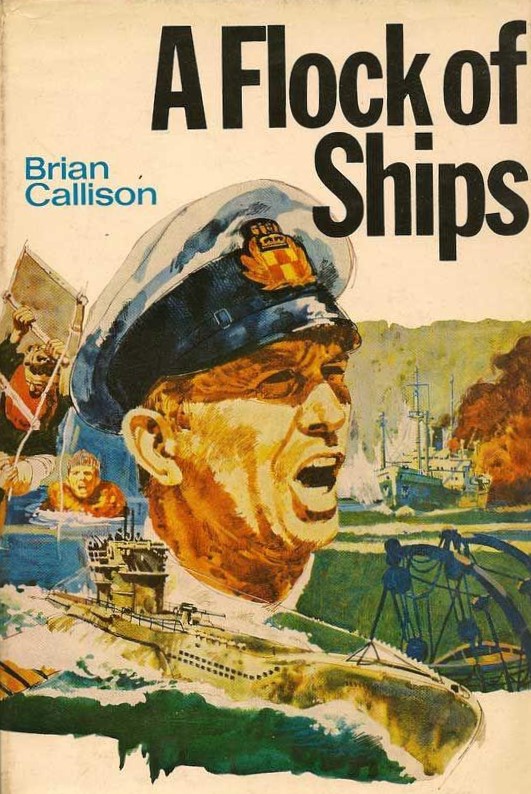 A FLOCK OF SHIPS by Brian Callison
A FLOCK OF SHIPS by Brian Callison
Reviewed by Richard Toogood
The year 1970 witnessed the salvaging of Isambard Kingdom Brunel’s derelict S.S Great Britain from its ignominious scuttled fate in the Falkland Islands. But it also saw first publication of a novel which depicted the discovery of another lost vessel, similarly at a remote South Atlantic island location. That novel was A FLOCK OF SHIPS. Its author was a novice writer by the name of Brian Callison. And no less an authority than Alistair Maclean hailed it as “the best war story [he had] ever read.”
According to the official record no one had visited the bleak horseshoe shaped island of Quintanilha de Almeida since 1903. But when a Royal Navy survey ship arrives it discovers the battle-scarred hulk of the M.V Cyclops, a vessel reported as sunk with all hands more than twenty-five years before. Boarding the derelict, the survey crew recover the personal log of Chief Officer Jonathan Kent. And it is via this record that the novel returns to the desperate spring of 1941 and to a top-secret voyage through the hostile waters off of the west coast of Africa.
A few months back I posted a review here of THE MIDNIGHT SEA, Ian Cameron’s story of an Arctic Convoy leading a charmed life in the winter of 1944. A FLOCK OF SHIPS compliments the reading of that book by virtue of being its complete antithesis. Not only does it substitute seasons and hemispheres but its small convoy of three merchantmen and solitary corvette escort are dogged by disaster at every turn.
Kent’s account actually begins with the torpedoing of the Commandant Joffre. Then in quick succession the senior wireless operator on Cyclops vanishes, presumed lost overboard. Inexplicable pyrotechnic displays begin to illuminate the night-time horizons, prompting course change after course change. Another U-Boat attack results in a savage firefight. And then to compound the tension exerting its grip on the strained officers of the watch a shocking incident of friendly fire feeds the suspicion that there is a German agent on board Cyclops embedded amongst the crew.
A FLOCK OF SHIPS is a classic page turner which is almost impossible to put down. But it is no gung-ho war caper. Cyclops might have an antiquated 4.7 cannon bolted onto her poop deck but she is no fighting vessel, and her crew are merchant sailors not naval Jack tars. Kent’s log candidly and credibly records both his own crippling fears, doubts and inadequacies and those of the men around him. But devastation, as is its wont, will often plant courage in even the faintest of hearts and in the book’s bitter blistering climax Kent experiences both the agony and the ecstasy that is the mark of true heroism.
Brian Callison [born 1934] remains arguably the last great product of the golden age of British thriller writing. But just as significantly he is of the first generation of war novelists to have lived through WW2 without actually having served in it. This is important because there is an undeniable seam of callousness and brutality evident in A FLOCK OF SHIPS that is often missing from the work of actual veterans. The affinity and mutual respect between foes commonly found in war novels of the 1950s is entirely absent here. Sailors of both sides are abandoned to flounder in the sea or unforgivingly machine-gunned in the water. The horrific reality of the impact of high velocity rounds is graphically described.
But to take that as evidence of the book being devoid of humanity or lacking in compassion would be entirely wrong. I would defy anyone to read chapters five and ten and not find them preying on the mind long afterwards.
With its manifest of secret cargoes, subterfuge and a mysterious island A FLOCK OF SHIPS navigates a delicate course between the demands of war fiction proper and the sort of lurid melodramas popularised by Dennis Wheatley at one time. That it succeeds in doing this so adroitly is a testament to Callison’s narrative skill. The authentic barrage of nautical jargon and terminology that accompanies the running of the ship, and which Callison acquired during his own service in the merchant navy during the 1950s, also helps anchor the book this side of the channel of credence.
Brian Callison is retired now, and has not published a new novel since 2008. If his name isn’t as familiar to some as it deserves to be then that is probably down to the film world not showing the interest in his work that it once afforded to competitors like Desmond Bagley and Colin Forbes. But considering the dog’s dinners Hollywood usually makes of good books maybe that indifference is all for the best.
I am in no position to know just how many war novels Alistair Maclean read in his lifetime. I have read more than my share and yet would still shy from such an unequivocal declaration as A FLOCK OF SHIPS being the best of them. But what I can say with confidence is that I’ve never read a better one.
Please give us your valuable comment